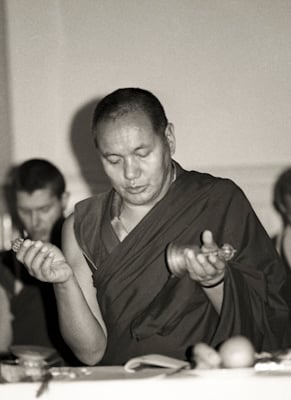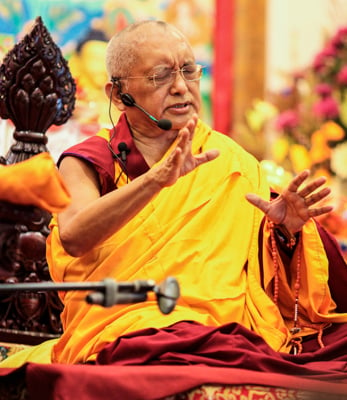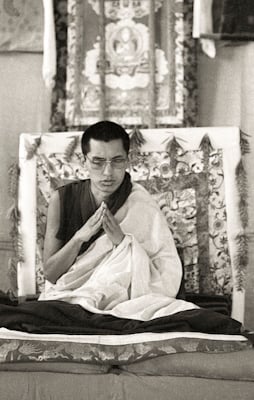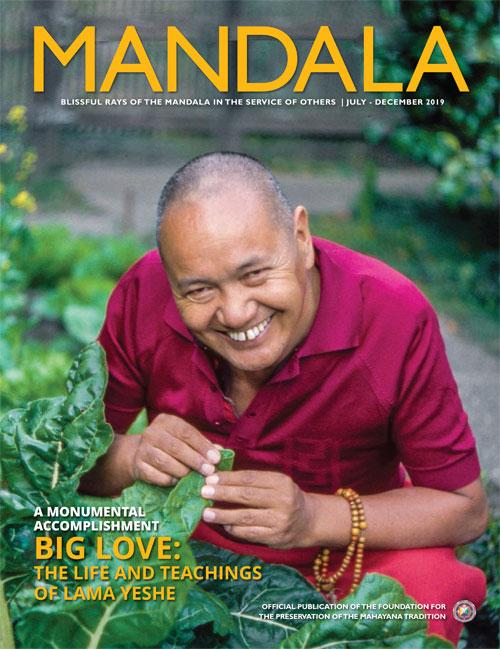Dear Friends,
Thank you so much for your interest in our monthly eletter. If you have missed our previous ones you can find them all here! Please share our news with your Dharma friends.
Big Love Update
New on the LYWA Podcast: Lama Yeshe on the purpose of meditation
The uncontrolled, undisciplined mind is, by nature, the opposite of knowledge-wisdom and happiness. Its nature is dissatisfaction. When you control your mind with wisdom you create the space you need to discover peace and joy. Your life then becomes peaceful and joyful and somewhat protected from the ups and downs of the external world.
-Lama Yeshe
 In this month's podcast, Lama Yeshe gave this clear, strong, perfectly skillful introductory talk on the purpose of meditation followed by an informal question and answer session in Los Angeles, California in 1975. For some it might be a bit difficult to understand Lama so we invite you to read along with the transcript here.
In this month's podcast, Lama Yeshe gave this clear, strong, perfectly skillful introductory talk on the purpose of meditation followed by an informal question and answer session in Los Angeles, California in 1975. For some it might be a bit difficult to understand Lama so we invite you to read along with the transcript here.
The LYWA podcast contains hundreds of hours of audio, each with links to the accompanying lightly edited transcripts. See the LYWA podcast page to search or browse the entire collection by topic or date, and for easy instructions on how to subscribe.
From the Video Archive: Lama Zopa Rinpoche & young Tenzin Ösel Hita in India, 1989
Lama Zopa Rinpoche and young Tenzin Ösel Hita (just four years old at the time and a very powerful presence indeed) visit friends, including HH Ling Rinpoche, at a variety of locations in India, 1989. Filmed by Venerable Roger Kunsang and narrated by Owen Cole.
Visit and subscribe to the LYWA YouTube channel to view dozens more videos freely available from our archive.
WHAT'S NEW ON OUR WEBSITE
 We have just posted the seventh discourse of Teachings at the Kadampa Deities Retreat. In this teaching Lama Zopa Rinpoche discusses how things are merely labeled, using the example of “Z” to explain how the label is applied to the base. Rinpoche also advises how to do walking meditation with the awareness that everything comes from the mind. Read an excerpt below. Also newly posted is Advice on Practices at the Mahabodhi Stupa, a teaching given while Rinpoche was in Bodhgaya, India, in 2012.
We have just posted the seventh discourse of Teachings at the Kadampa Deities Retreat. In this teaching Lama Zopa Rinpoche discusses how things are merely labeled, using the example of “Z” to explain how the label is applied to the base. Rinpoche also advises how to do walking meditation with the awareness that everything comes from the mind. Read an excerpt below. Also newly posted is Advice on Practices at the Mahabodhi Stupa, a teaching given while Rinpoche was in Bodhgaya, India, in 2012.
As usual we would like to share with you new additions to Lama Zopa Rinpoche's Online Advice Book:
- Chenrezig Practice in Prison: In this advice, Rinpoche explains how to use the situation in prison to develop the mind, Rinpoche also recommends Chenrezig mantra recitation and discusses its benefits.
- Experience the Difficulties with a Good Heart: Advice on how to transform problems, given to a student who was staying in Bodhgaya during the hot summer.
- Advice for a Happy Life: Rinpoche explains how to create the cause of happiness in this life and future lives, until enlightenment is achieved.
- Practices to Avert Financial Ruin: Advice for a family that was in debt and faced losing their home. Although they had been reciting sutras the situation had not changed.
On our website, you can always find a list of all the newly-posted advices from Lama Zopa Rinpoche.
LAMA YESHE'S ENLIGHTENED EXPERIENCE
 As we anticipate the arrival of Big Love, we are happy to herald the completion of The Enlightened Experience: Collected Teachings, our new two volume ebook series by Lama Yeshe.
As we anticipate the arrival of Big Love, we are happy to herald the completion of The Enlightened Experience: Collected Teachings, our new two volume ebook series by Lama Yeshe.
Lama gave these brilliant teachings while he traveled around the world with Lama Zopa Rinpoche in the 1970s and 1980s. As many of you know, Lama Yeshe was a pioneer in bringing the Dharma to Westerners and the teachings in this series demonstrate Lama's understanding of the Western psyche and his ability to express profound truths in simple, accessible terms.
Get your own two-volume set of The Enlightened Experience from Smashwords or see our website for more vendor links. And remember, LYWA Members can download both volumes for free from the Members Area.
Please help us publish Big Love!
As I mentioned above, for just $250 you can become a sponsor of this amazing work and get onto the list of people who will be sent the book immediately upon publication. Thank you again for your interest in and support of LYWA. We couldn’t do it without you!
Much love

Nick Ribush
Director
THIS MONTH'S TEACHING: How a Positive Label Creates the Cause for Happiness
 In our daily life, we should look at our suffering as positive; we should look at any unfavorable conditions as positive and good. If somebody criticizes us, think, “Oh, this purifies my negative karma. I have created the karma to receive criticism and this purifies my negative karma.” Like that we can look at the situation as positive. When the person criticizes us, we should see the criticism as positive. We should see it as benefiting, not harming, because we can see it’s purifying negative karma.
In our daily life, we should look at our suffering as positive; we should look at any unfavorable conditions as positive and good. If somebody criticizes us, think, “Oh, this purifies my negative karma. I have created the karma to receive criticism and this purifies my negative karma.” Like that we can look at the situation as positive. When the person criticizes us, we should see the criticism as positive. We should see it as benefiting, not harming, because we can see it’s purifying negative karma.
Whether we made a mistake that the person criticizes or even if we didn’t make a mistake, we are still purifying the negative karma which we created in the past. So like that, look at the situation as positive.
You can think of [patience] as a weapon. Think that the person is helping you destroy your ego and practice patience so that you can overcome anger and be free from anger forever. Think, “This anger is the greatest obstacle to my happiness and merit.” Think that you are destroying the ego, just as a bullet or missile is dropped from a United States airplane. The airplane drops this long missile or bomb—it goes this way and then hits [the target.] Whether it’s called a bomb or missile, whatever it is, think your patience is a missile or bomb to destroy your ego.
Anyway, just as we label, “This is a table,” or “This is a cloth,” or “This is yellow,” or whatever, here in this kind of situation we should put a positive label on that person, thinking, “This person is extremely kind.” So put a positive label on them, like that. This helps, instead of putting a negative label by following attachment and the self-cherishing thought.
When we put a negative label on the person and their actions, we are following our attachment and self-cherishing thought. We are a friend to the attachment and self-cherishing instead of harming them. However, by following patience we only see the positive and we can put a positive label on that person and their actions.
Similarly, with the view of compassion and bodhicitta, we can put a positive label. By putting a negative label, it affects to our mind; it disturbs our mind immediately. If we put a negative label on the person, their actions and the situation, it disturbs our mind. But if we put a positive label on the person and their actions, our life situation becomes different from what we expected. Something becomes different; our life situation changes when we label positively. Immediately there is a positive effect, peace. By putting a positive label there’s immediate peace in our heart.
I think that’s one reason why it’s important to practice thought transformation. The immediate effect, the immediate benefit, the profit to our mind—besides helping us avoid anger or strong negative emotional thoughts, such as desire or the self-centered mind—is that it protects us from engaging in heavy negative karma. It protects us from negative karma—it doesn’t allow us to create negative karma and it inspires more good karma, the cause of happiness.
If everybody together criticizes that person it becomes collective karma. The harm to that person becomes collective karma. In a country, along with the leader, if a whole nation agrees or if many millions of people agree to harm others with anger, to make war and to harm others, then that becomes very strong collective karma.
This is an excerpt from teachings given by Lama Zopa Rinpoche at a retreat held at Institut Vajra Yogini, France, from 18 April to 11 May 2003. You can continue reading it here.






























